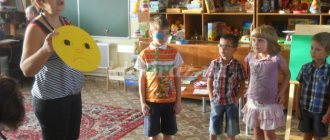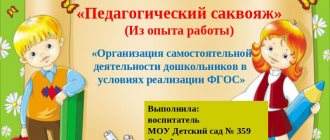Federal State Educational Standard for Education on interaction with parents of preschool childrenmaterial on the topic
Memo for teachers
GEF DO
about interaction with parents
pupils
One of the principles formulated in the Federal State Educational Standard for Educational Education is:
- Personal developmental and humanistic nature of interaction between adults (parents (legal representatives), teaching and other employees of the Organization) and children (part 1, clause 1.2, clause 2)
One of the basic principles of preschool education is:
- Cooperation of the Organization with the family (part 1, clause 1.2., clause 5).
One of the tasks that the Standard is aimed at solving is:
- Combining teaching and upbringing into a holistic educational process based on spiritual, moral and sociocultural values and socially accepted rules and norms of behavior in the interests of the individual, family, society (Part 1, Clause 1.6, Clause 2)
- Providing psychological and pedagogical support for the family and increasing the competence of parents (legal representatives) in matters of development and education, protection and promotion of children’s health (Part 1, paragraph 1.6., paragraph 9).
The standard is the basis for:
- Providing assistance to parents (legal representatives) in raising children, protecting and strengthening their physical and mental health, developing individual abilities and the necessary correction of their developmental disorders (part 1, clause 1.7., clause 6)
The standard specifies requirements that are aimed at creating a social development situation for participants in educational relations, including the creation of an educational environment that:
- Ensures openness of preschool education (Part III, clause 3.1, clause 5)
- Creating conditions for the participation of parents (legal representatives) in educational activities (Part III, clause 3.1., clause 6)
- One of the psychological and pedagogical conditions for the implementation of basic educational programs of preschool education is:
- Support for parents (legal representatives) in raising children, protecting and promoting their health, involving families directly in educational activities (Part III, clause 3.2.2, clause 8)
- Also, Part III of the Standard specifies conditions aimed at creating a social situation for the development of children that corresponds to the specifics of preschool age:
- Interaction with parents (legal representatives) on issues of the child’s education, their direct involvement in educational activities, incl. through the creation of educational projects together with the family based on identifying the needs and supporting the educational initiatives of the family (Part III, clause 3.1., clause 6)
- In order to effectively implement the educational program, conditions must be created for:
- Advisory support for teaching staff and parents (legal representatives) on issues of education and child health, incl. inclusive education (if it is organized) (part III, clause 3.1., clause 6)
- The Organization must also create opportunities, incl. to provide information about the Program to the family and all interested parties involved in educational activities, as well as the general public (Part III, clause 3.1., clause 6)
Project “Open kindergarten - open parents”
Project objectives: selection and testing of active forms of interaction with parents of preschool children for effective cooperation between preschool educational institutions and families; create conditions for creative self-expression and self-realization of subjects of the educational process through joint child-parent events; analyze the results, identify the effectiveness and possibilities of transferring this experience.
The topic of the project was not chosen by chance. At the present stage, kindergarten is gradually turning into an open educational system: the pedagogical process of a preschool institution is becoming more free, flexible, differentiated, where teachers focus on cooperation and interaction with parents.
Working with parents is one of the most important aspects of the activities of preschool educational institutions. The forms of interaction with the family used by the teaching staff of the Solnyshko Kindergarten show positive results. But the characteristics of a modern parent force us to look for more and more new forms of active interaction with the family to involve them in the educational activities of a preschool institution. Therefore, the conceptual idea of project activity is closely related to the radical restructuring of work with families in preschool educational institutions: the transition from monological traditional forms of work to dialogue, reflection, and the involvement of parents in a variety of joint activities with children.
We assume that this approach will make teachers like-minded people, raise the psychological and pedagogical competence of parents, and also allow kindergarten teachers to use innovative forms of active interaction with the family in their work.
The problem of interaction between kindergarten and family has always been relevant. Relevant because the participation of parents in the lives of their children helps them see a lot, and also because all parents are different, they, like children, need a special approach.
Based on the observations of teachers, as well as from conversations with parents, we made the following conclusions: you don’t often see parents at informational events; more parents are attracted to entertainment events. Basically, they are only interested in the child’s nutrition; they believe that kindergarten is a place where they only look after children while parents are at work. And we, teachers, very often experience great difficulties in communicating with parents for this reason.
Another feature is the psychological aspect. Reduced free time for parents and overload at work lead to increased irritability, fatigue, and stress. Parents transfer their emotions to their children. The child finds himself in a situation of complete dependence on the mood, emotions and reactions of his parents, which affects his mental health.
Awareness of this helped to identify the problem: - one of the main reasons for the lack of activity of the kindergarten in involving parents in the educational process is the lack of a model of activity that includes mutually interesting forms of cooperation, involving parents in the educational process, as well as a space where parents could realize your potential.
Traditional forms of work do not always bring positive results. Under existing conditions that are adequate for organizing cooperation with parents, active forms of work that allow increasing the pedagogical competence of parents are not sufficiently used. Therefore, we need to look for new forms and fill them with pedagogically effective content.
3. Explanatory note. This project is aimed at changing the very philosophy of interaction between kindergarten and family: on the one hand, kindergarten becomes an institution of comprehensive support and promotion of the development of parental competence, on the other hand, cooperation between parents and preschool institution is considered as a prerequisite for ensuring the full development of the child. In the process of implementing the project, there is a transition from the concept of “working with parents” to the concept of “interaction”; there is a search for a common language of contact and mutual understanding, recognition of each other’s strengths and weaknesses. Interaction is a way of organizing joint activities, which is carried out through constructive communication. Preschool institutions and families should strive to create a single space for the comprehensive development of the child.
The novelty of the project lies in the creation of a model of effective interaction between the institution and the child’s family and the involvement of parents in the educational process of the kindergarten as full subjects of activity.
A feature of this project is an integral part of the teacher’s activity in introducing innovative forms of activity within the framework of the work of a preschool educational institution, in which the nature of parent-child relationships is revealed, problems and tasks are identified, and ways of implementing these tasks in a variety of activities with children are built.
Project type: short-term, practice-oriented, collective.
The goal of the project: to create and introduce into the educational process of a preschool institution a model of interaction between teachers and families of pupils, involving them in a single educational space as full-fledged subjects of activity.
Project objectives:
- selection and testing of active forms of interaction with parents of preschool children for effective cooperation between preschool educational institutions and families;
- create conditions for creative self-expression and self-realization of subjects of the educational process through joint child-parent events;
- analyze the results, identify the effectiveness and possibilities of transferring this experience.
Project participants: students and their parents (legal representatives), teaching staff of the educational institution.
Conditions for the implementation of the project: interest of children and parents, regularity and systematic work.
Project implementation period: January 2021 – March 2021.
Basic principles of organizing work with families:
- openness of the kindergarten to the family (each parent is provided with the opportunity to know and see how his child lives and develops);
- cooperation between teachers and parents in raising children;
- creation of an active developmental environment that provides unified approaches to personal development in the family and children's team;
- establishing trust and partnerships with parents;
- differentiated approach to different families, taking into account their individual characteristics.
The project is being implemented in two main areas of interaction with families:
- Increasing the level of pedagogical competence of parents through parent meetings, oral journals, parent corners, moving folders, group consultations, individual conversations, coaching sessions, parent living rooms, round tables.
- Involving parents in the work of the kindergarten through the organization of leisure activities using non-traditional forms.
Predicted results and criteria for their evaluation: The main criterion for evaluating results is feedback from parents; “feedback”, exhibitions. Possible risks: not all parents will be active.
In the process of implementing project activities, the following results are expected:
- the joint work of the team of the Solnyshko Kindergarten with the family will contribute to the creation of a unified educational space for all participants in the project activities;
- openness and accessibility of preschool educational institutions for parents and the public;
- parents will turn from “observers” into active participants in the educational process;
- increasing the level of pedagogical competence of parents in matters of education and development of preschool children through visual and informational support for the family;
- creation of a modern model of interaction between preschool educational institutions and families.
Conclusion. Thus, the creation of a new model of interaction between preschool educational institutions and families, based on the introduction of innovative methods and forms into the activities of the institution, will help achieve high results in working with all subjects of the educational process.
Work on interaction between the teacher and the family should contribute to: creating a positive emotional environment of communication between children, parents and teachers;
activation and enrichment of pedagogical knowledge and skills of parents; improving the psychological, pedagogical and legal culture of parents; development of versatile abilities of children and parents in joint activities; establishing continuous connections with children of preschool institutions and their parents. For the full text of the material “Open kindergarten - open parents” project, see the downloadable file
. The page contains a fragment.
| Author: Lapshova L.V., Vaganova S.F. → Publisher 05/10/2018 0 8142 448 | Comment |
Thank you for your mark. If you want your name to be known to the author, log in to the site as a user and click Thank you again. Your name will appear on this page.
Login | Registration
Have an opinion? Leave a comment



